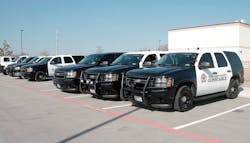Williamson County fleet saves $73k on fuel costs annually
Williamson County expects to save $73,000 on fuel costs annually running fleet vehicles on propane autogas, the world's most widely used alternative fuel. The Central Texas county began converting vehicles to autogas in 2009, and now operates 36 clean vehicles across nine departments, including EMS, Williamson County Constables and the Parks Department.
"We are pleased to be able to convert part of our fleet to propane autogas, which is domestically produced in Texas, and is less expensive than gasoline or diesel fuels," said Williamson County Commissioner Cynthia Long. "In addition to being more economical, autogas is cleaner burning which makes it better for engine maintenance and emissions."
More than 18 million vehicles worldwide run on propane autogas. U.S. fleets that convert vehicles to autogas save an average of 50 percent on fuel costs and autogas vehicles produce less greenhouse gas emissions and harmful pollutants than gasoline vehicles. Because autogas is a cleaner fuel, many fleets also report reduced maintenance needs and extended engine life.
In addition to saving on fuel costs, Williamson County was able to take advantage of the $0.50 per gallon Alternative Fuel Motor Tax Credit, a federal incentive available through the IRS for fleets that choose propane autogas.
The 36 autogas-powered vehicles in the Williamson County fleet include eight with autogas-dedicated systems and 26 with bi-fuel autogas systems. Bi-fuel autogas vehicles are a popular option for fleets because of their flexibility. Fleets can easily and inexpensively convert existing vehicles to autogas with a dual-fuel system that provides both extended vehicle range and peace of mind for drivers.
Propane autogas is widely available throughout Texas, with more than 700 autogas fueling stations across the state. Williamson County has built six autogas fueling stations, each with a storage capacity of 2,000 lbs. Many fleets install their own on-site autogas fueling stations at a fraction of the cost of a compressed natural gas (CNG) fueling station.
"Williamson County is just one of the many U.S. fleets making the transition to propane autogas," said Jackie Mason, education and marketing director of the Propane Council of Texas (ProCOT). "Across Texas, more fleet owners and operators are choosing autogas to power their fleets because it's simply the most viable fuel on the market. Autogas is environmentally friendly, cost-effective and made in America—the ideal fuel for fleets looking to reduce emissions and their fuel costs."
